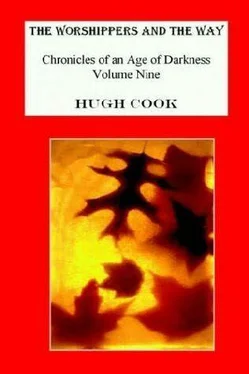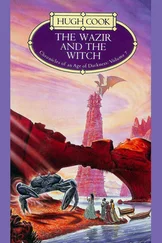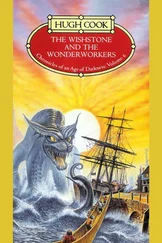Hugh Cook - The Worshippers and the Way
Здесь есть возможность читать онлайн «Hugh Cook - The Worshippers and the Way» весь текст электронной книги совершенно бесплатно (целиком полную версию без сокращений). В некоторых случаях можно слушать аудио, скачать через торрент в формате fb2 и присутствует краткое содержание. Жанр: Фэнтези, на английском языке. Описание произведения, (предисловие) а так же отзывы посетителей доступны на портале библиотеки ЛибКат.
- Название:The Worshippers and the Way
- Автор:
- Жанр:
- Год:неизвестен
- ISBN:нет данных
- Рейтинг книги:4 / 5. Голосов: 1
-
Избранное:Добавить в избранное
- Отзывы:
-
Ваша оценка:
- 80
- 1
- 2
- 3
- 4
- 5
The Worshippers and the Way: краткое содержание, описание и аннотация
Предлагаем к чтению аннотацию, описание, краткое содержание или предисловие (зависит от того, что написал сам автор книги «The Worshippers and the Way»). Если вы не нашли необходимую информацию о книге — напишите в комментариях, мы постараемся отыскать её.
The Worshippers and the Way — читать онлайн бесплатно полную книгу (весь текст) целиком
Ниже представлен текст книги, разбитый по страницам. Система сохранения места последней прочитанной страницы, позволяет с удобством читать онлайн бесплатно книгу «The Worshippers and the Way», без необходимости каждый раз заново искать на чём Вы остановились. Поставьте закладку, и сможете в любой момент перейти на страницу, на которой закончили чтение.
Интервал:
Закладка:
His father's body should have been burnt here, for this was hallowed ground, and the rightful place for every Frangoni funeral. But the manner of the death of Lamjuk Dakoto Hatch had made such an honorable funeral impossible, for that death had brought shame upon Lamjuk Dakoto, and upon his children, and upon the children of his children. And so he had been burnt by the waters of the Yamoda, burnt like a dead dog, and his ashes had still to find a fitting resting place.
So, when the acolyte raised his eyes and looked at Asodo Hatch, Hatch did not meet his gaze. He tried to shrug off the memories of his father's death.
– Death is death, and can I undo it?
Thus he tried.
But he was only half-successful.
Asodo Hatch was wearing manhood's purple robes, but the acolyte wore red and black, for such were the colors of the Great God Mokaragash. Likewise colored were the temple's totem poles.
Hatch remembered reading that black and red are perennially popular with primitive tribes, since charcoal and ochre are easy to use. He tried to put this thought also out of mind, since the thought was vulgar, and the ground he trod was sacred.
– This is my God.
So thought Hatch. But the thought was faked, and he knew it.
He was trying by an exercise of will to contend against the scepticism bred into him by long years of contact with the Nexus, and he was failing.
– God of my bones. God of my blood. God of my people.
Again the thought was forced and fraudulent. But Hatch matched actions to thought, bowing to the first and greatest of the graven images of the Great God Mokaragash, a huge slab of stone carved in the shape of a slovenly, almost amorphous face.
The only sharply detailed features were the deep-cut shadows of the eye sockets. Mokaragash is He Who Sees Without Eyes, but He sees to a grim purpose, and the blood which stained the eyesockets was fresh.
"Lord," said Hatch, addressing his god.
Amongst the Frangoni, an idol is not a symbolic representation of an entity located Elsewhere. Rather, the deity is presumed to be incarnate in the image. Thus Hatch should have been awed, humble and slightly apprehensive, since he stood in the actual presence of his god. But in truth | | Today he could not deny it.
Today he was seeing Temple Isherzan through the eyes of the Nexus. He could no longer forget the realms of transcosmic science and computerized ethnology simply by exiting from the lockway. The tricks of unlearning, of setting aside knowledge, no longer worked. He stood in the temple as a tourist-stranger from the Nexus, and found himself comparing the temple's people to the jabbering barbarians of the Wild Tribes of the Eye of Delusions.
– I did not choose this.
That much at least was true. Hatch had never wished to be a stranger amongst his own people – but then, choice had not been a part of his birthright. Asodo Hatch had been born into slavery. He was not free to choose his own destiny, for, like every Frangoni male of Dalar ken Halvar, he was bound forever in servitude to Plandruk Qinplaqus, the Silver Emperor who ruled the Empire of Greater Parengarenga.
Since earliest youth, Hatch had been attracted to the realm of Final Things. Given free choice, he would have become a priest: a master of mysteries, a keeper of numinous secrets, an inner associate of the Great God Mokaragash. But free choice had ever been denied to him, and so he had become a soldier in the service of the Silver Emperor, since that was how the lord of Na Sashimoko wished to be served.
At the age of 11, Hatch had sat the requisite aptitude tests, had passed, and had entered into the Combat College, and thus had been thrust amongst people who had no caste. From that day forth, everything he used was unclean, tainted by the sweat of a foreign people. The food he ate was demon-stuff fabricated out of shadow.
It sustained life, yet it too was unclean.
So Hatch in his very childhood had been forced to leave the security of the Frangoni rock to dwell amongst strangers. At puberty he was denied the gold: he entered manhood with his ears as yet unpierced. He drank green milk and ate the meat of whales, while foreign languages pressed upon his ears until he found himself waking from dreams to realize that his very sleep had been phrased in the Commonspeak of the Nexus.
Burdened by such training, it was hard for Hatch to be a Frangoni, even on the Frangoni rock.
Yet – Hatch paused upon the heights, and looked to the east, looked out across the shackwork streets of Actus Dorum, the windings of the Yamoda River, the distant heights of Blogo Zo and the red eternities of the Plain of Jars beyond. He sometimes found that the evergaze distances of the far horizons allowed him to step outside himself, to distance himself from his own condition and thus gain insight into that condition.
Thus it was in this case, for, in the peace of the far horizons, Asodo Hatch was granted a moment of grace, and in that moment he acknowledged to himself a difficult truth. The truth was that, though his cultural laments were not faked or fraudulent, they were nevertheless secondary. He had enlarged them to primacy to hide from himself the full extent of his griping concern for a far more urgent problem – the state of his finances.
– Admit it, Hatch, admit it.
Hatch admitted it as he resumed his upward trudge in the sunsweat heat. He admitted it reluctantly. A grand clash of cultures, a conflict of national destinies – ah, there lay drama!
But that which oppressed him was the squalid greeding and grasping of commercial life, something which should not afflict a hero.
– A hero? You want to be a hero?
Yes. Hatch wanted to be a hero. Like his father. But his father, well, his father…
– My father was a fool.
So thought Hatch, and halted as he thought it, the stones of the Frangoni rock seeming unstable underfoot. He could not, would not, should not, must not think such things. But he had. Thoughts themselves have consequences, and this one could not be canceled into oblivion. It was true. The old man had been a fool. In his folly, he had gone down to grief in full view of the public, dying for, for…
– What did he die for?
– For nothing.
Suddenly it was pleasure, pure pleasure, for Hatch to retreat to thoughts of his finances, to a consideration of the pressures of his debts, and he concentrated on figuring gold and silver in his head as he pressed on toward the lair of the High Priest, striving to shut out all thoughts of his father and his father's fate.
Usually a High Priest in the service of the Great God Mokaragash does not undertake pastoral duties. But Asodo Hatch was a person of no small importance. After all, as a captain of Dalar ken Halvar's Imperial Guard he had the ear of the Silver Emperor himself. So, though his was not one of the Three Questions which any worshipper could put to the ecclesiarch of the Frangoni Rock, Temple Isherzan's sensitivity to political nuance entitled Hatch to ask as he wished.
This was only natural.
"Every religious organization is also and necessarily a political organization. Consequently the hierarchy of any established religion tends to be dominated by individuals whose key skills are political."
So says the Book of Politics.
Hatch remembered that wisdom as he waited on the pleasure of a junior priest. The junior was fool enough to deny knowledge of the visitor's mission, and kept Hatch waiting while certain Tablets of Appointments were laboriously consulted. Hatch had firmly committed the junior's demerits to memory by the time he was at last allowed to step into the presence of the Inner Idol.
In the presence of the Inner Idol stood Sesno Felvus, ethnarch of Dalar ken Halvar's Frangoni, and therefore necessarily High Priest of the Great God Mokaragash. Felvus, heavily burdened with ceremonial robes of red and black, was busy with pestel and mortar, grinding the bones of a dead man for ritual purposes. When at last he finished, he abluted his hands in lustral water, then acknowledged Hatch with a nod.
Читать дальшеИнтервал:
Закладка:
Похожие книги на «The Worshippers and the Way»
Представляем Вашему вниманию похожие книги на «The Worshippers and the Way» списком для выбора. Мы отобрали схожую по названию и смыслу литературу в надежде предоставить читателям больше вариантов отыскать новые, интересные, ещё непрочитанные произведения.
Обсуждение, отзывы о книге «The Worshippers and the Way» и просто собственные мнения читателей. Оставьте ваши комментарии, напишите, что Вы думаете о произведении, его смысле или главных героях. Укажите что конкретно понравилось, а что нет, и почему Вы так считаете.












